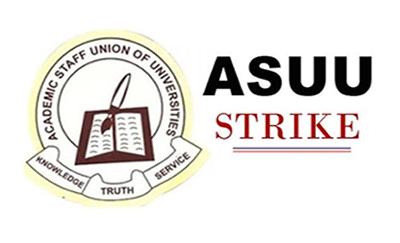NIGERIA’s university system faces the prospect of a fresh shutdown as tensions mount between the Federal Government, the Academic Staff Union of Universities (ASUU), and the National Association of Nigerian Students (NANS).
News Point Nigeria reports that, on Monday, NANS warned it would mobilise students nationwide to shut down critical infrastructure including airports, highways, and government offices, if the Federal Government failed to avert the looming strike threatened by ASUU.
The threat came just hours after ASUU’s zonal branches across the country reiterated their long-standing demands, warning of an “imminent” strike if government continued to ignore unresolved issues.
Speaking in Abuja, NANS Assistant General Secretary, Emmanuel Adejuwon, issued a blunt warning:
“Let it be on record: if this strike is not averted, we will bring the country to a standstill until the future of Nigerian students is secured. The time for games is over. The Federal Government must act now. ASUU must act responsibly. And Nigerian students will not sit idle while our future is wasted.”
Adejuwon stressed that it was the children of ordinary Nigerians who suffer during strikes, not the political elite.
“The children of politicians and senior government officials are studying abroad or in expensive private universities. Only the masses are left stranded when public universities shut down,” he said.
The NANS official also accused the government of “endless promises and insincerity”, declaring that students were tired of being perpetual victims of leadership irresponsibility.
At the same time, he urged ASUU to rethink its tactics, cautioning that repeated strikes only prolong students’ academic calendars, “diminishing the quality of education and destroying futures.”
Meanwhile, ASUU intensified its campaign across zones, warning that patience among lecturers had run out.
In Ibadan, Prof. Biodun Olaniran, ASUU Zonal Coordinator, called on the Federal Government to immediately implement the Yayale Ahmed report, submitted in February, which he described as a negotiated consensus capable of ending recurring disputes.
“The true test of government’s sincerity lies in how it handles the Yayale Ahmed report. Our members are frustrated with delay tactics and are no longer willing to be dragged along endlessly. Implementing this report is the surest way to restore confidence and industrial peace,” Olaniran said.
He listed the union’s demands:
Full implementation of the 2009 ASUU-FGN Agreement on sustainable funding of universities
Payment of 25–35% salary awards still outstanding
Settlement of promotion arrears and third-party deductions
Release of earned academic allowances
End to the use of the IPPIS platform, which ASUU has rejected
Respect for university autonomy, including reversal of unlawful Governing Council dissolutions
In Abuja, Prof. Al-Amin Abdullahi, another ASUU zonal coordinator, echoed the grievances.
“There is a crisis affecting universities in Nigeria, and it is not just a problem for ASUU; it is a problem for the entire country. Neglecting education mortgages the nation’s future and endangers generations yet unborn,” he warned.
In Uyo, the Calabar Zone of ASUU flatly rejected the newly launched Tertiary Institution Staff Loan Scheme, branding it a “poison chalice”.
Zonal Coordinator Dr. Ikechukwu Igwenyi argued that offering loans while withholding salaries and allowances was both insulting and deceptive.
“It insults our sensibilities that a government which has refused to renegotiate a 17-year-old salary structure now offers loans as a palliative. This is infantile cunning and a distraction from its failure to honour agreements,” Igwenyi said.
He further warned that ASUU’s planned meeting with the Federal Government on August 28 would be its last attempt at dialogue.
With ASUU hardening its stance and NANS threatening disruptive protests, the August 28 meeting has become a decisive moment for the government.
Education analysts warn that another prolonged strike could deepen Nigeria’s brain drain, worsen overcrowding in classrooms, and cripple academic calendars already battered by past shutdowns.
For Nigerian students, the message remains uncompromising. As Adejuwon declared:
“Enough of endless promises. The time for games is over. The Federal Government must act now, ASUU must act responsibly, and Nigerian students will not sit idle while our future is wasted.”







